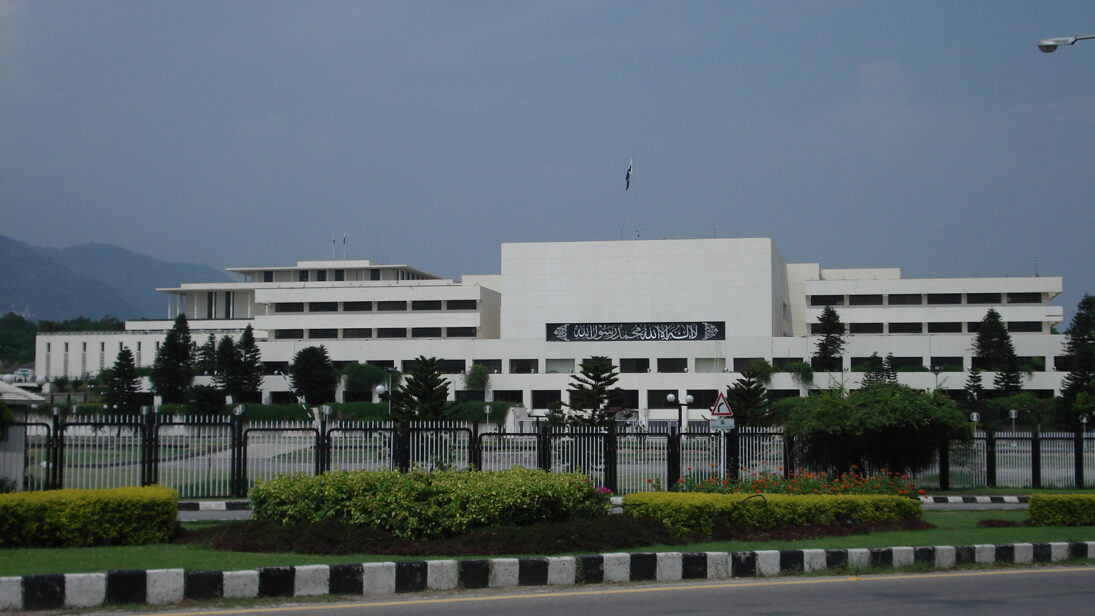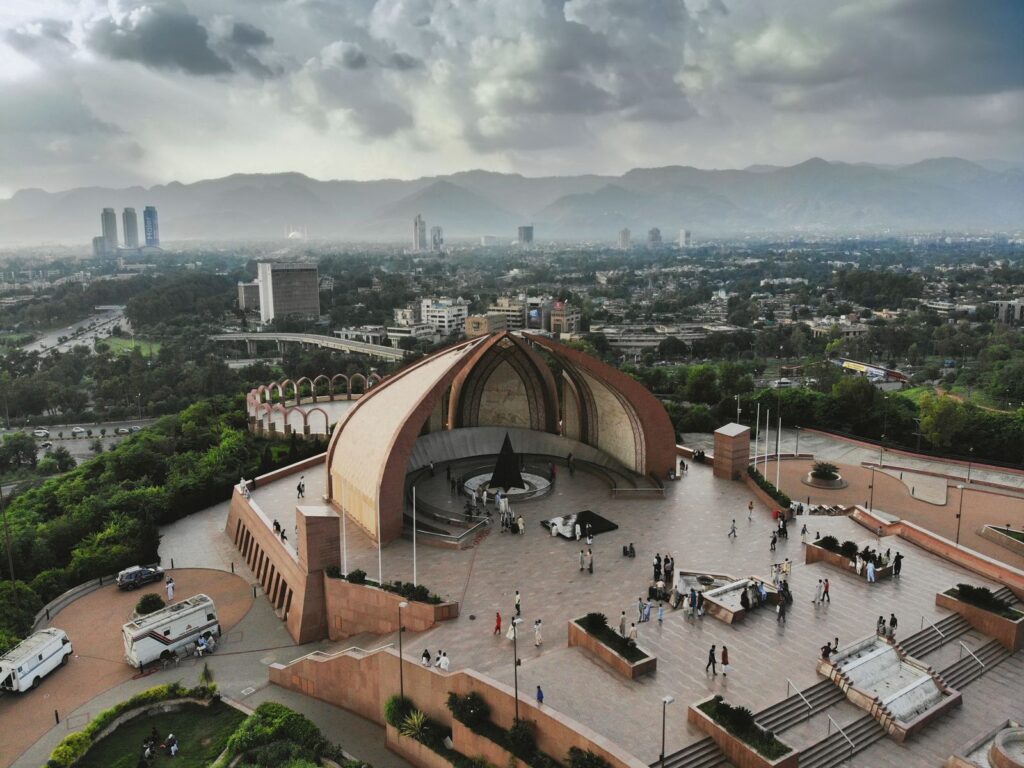
On March 22nd and 23rd, Pakistan hosted the 48th session of the Council of Foreign Ministers (CFM) of the Organization of Islamic Cooperation (OIC) in Islamabad. The OIC session was ultimately the last diplomatic achievement of Pakistan Tehreek-e-Insaaf (PTI) while in power. In the lead-up to the summit Imran Khan faced a looming no-confidence vote. Though it was filed in early March, the no confidence vote was postponed due to the OIC session. However, on April 3, instead of hosting the motion, it was ruled out by the Speaker of National Assembly based on Article 5 of the constitution—loyalty to the state and constitution. Minutes later, the President dissolved the National Assembly calling for early elections. Five days later, the Supreme Court reconvened the National Assembly to proceed with the motion, leading to the ousting of Imran Khan and the appointment of a new Prime Minster, Shehbaz Sharif, voted in by the National Assembly on April 11.
Despite the political turmoil in the country, the PTI-led government was able to successfully convene the OIC session and secure broader diplomatic objectives. This included practicing a balanced foreign policy through calling for solidarity with Ukraine, and by inviting representatives from both the United States and China to discuss policy issues, Islamabad also expressed its desire to remain neutral during great power competition, one of the reasons PTI government attributes its expulsion to.
As successful as the summit may have seemed for Pakistan’s government at the time, it is unclear whether the diplomatic dividends of the session are to be realized. With political uncertainty in Pakistan following Imran Khan’s departure, it is unlikely Islamabad will look beyond domestic politics in the near future.
Diplomatic Gains: Regional Politics
Pakistan secured commitment from the OIC members in favor of Islamabad’s stance on Kashmir and response to the accidental missile launch by India, and was able to institutionalize humanitarian commitment to Afghanistan.
Islamabad gathered support in favor of its stance on Kashmir opposing India’s unilateral revocation of special status of Jammu and Kashmir. In the Islamabad Declaration, the OIC reiterated support for the right of self-determination of Kashmiris and deemed India’s 2019 abrogation of Jammu and Kashmir’s statehood as illegal. While this is not the first time the OIC has made such a statement in line of Islamabad’s stance vis-à-vis Kashmir, the OIC’s action plan involves unprecedented demands for member states. In one of the action items, the OIC contact group on Jammu and Kashmir called on the members states to raise the dispute of Indian Administered Kashmir with India in their bilateral engagements. This is an exceptional development given New Delhi considers matters related to Jammu and Kashmir as “internal affairs,” evident from India’s prompt condemnation of Chinese support on Kashmir dispute, calling it an “uncalled reference.” In 2020, the OIC refraining from supporting Pakistan’s stance on Kashmir had also briefly caused a rift in Pakistan-Saudi Arabia ties.
Islamabad gathered support in favor of its stance on Kashmir…the OIC reiterated support for the right of self-determination of Kashmiris and deemed India’s 2019 abrogation of Jammu and Kashmir’s statehood as illegal.
Similarly, Pakistan was able to use the forum to internationalize regional issues including the “accidental” BrahMos cruise missile launch by India into Pakistan on March 9. While Gulf states like the UAE had previously refrained from commenting on the bilateral issues between Pakistan and India—calling it an internal matter—the member states underlined support for joint probe between Pakistan and India, a request made by Islamabad to investigate the findings of the incident.
Alongside the United States, Pakistan institutionalized its humanitarian commitment to Afghanistan through OIC. Previously, during the 17th Extraordinary Session of the OIC Council of Foreign Ministers last December, a trust fund was established to facilitate humanitarian aid to Afghanistan and prevent Afghanistan’s economic collapse. At the 48th CFM, the fund was operationalized and Nigeria made the first donation of USD $1 million. While Pakistan may be taking a more proactive role in Afghanistan, these efforts may be complicated by growing tensions with the Taliban and diverted humanitarian resources towards Ukraine. The international community and the United States has also been reluctant to allow financial capital flow through the government owing to the Taliban’s history of severe governance and restrictions—such as Kabul’s decisions to maintain ban on girl’s education which has received widespread criticism. For the humanitarian aid efforts to be realized the OIC must work in cooperation with international organizations, not in silos.

Diplomatic Gains: Global Politics
The PTI-led government also capitalized on its role as host of the conference to advance its foreign policy goals, signaling willingness to practice an independent foreign policy.
The 48th OIC session was a demonstration of Pakistan’s balanced foreign policy: by hosting China and the United States both for the first time at a summit, Khan’s government indicated its desire to stay of out camp politics and reap benefits from interactions with both great powers. Analysts have questioned the gap between intent and implementation of Pakistan’s neutral foreign policy vis-à-vis the Ukraine conflict, pointing to Khan’s visit to Moscow amidst the crisis. At the conference, Pakistan’s call for solidarity with Ukraine was appreciated by the United States. Citing economic repercussions, Prime Minister Khan stressed on dialogue between Russia and Ukraine to end the conflict. The member states of OIC also called to establish humanitarian corridors to ensure safe movement of civilians and for provision of humanitarian supplies to Ukraine. Pakistan was able to make its case for neutral stance on the conflict, clarifying its independent perspective.
By hosting China and the United States both for the first time at a summit, Khan’s government indicated its desire to stay of out camp politics and reap benefits from interactions with both great powers.
Pakistan also attempted to portray itself as a bridge between China and the Muslim world. The fact that the Chinese Foreign Minister Wang Yi was a special guest indicates willingness of both Beijing and Muslim countries to deepen ties, with Pakistan as facilitator. In prior relations with the Middle East, China appeared to have adopted a cautious neutral stance on the political conflicts by maintaining a working economic relationship with almost all regional rivals—Iran, Saudi Arabia, and Israel. However, at the session, China has expressed explicit support for the just settlement of Palestinian conflict, signifying Beijing’s intent to expand political and economic relations with the Muslim countries. In 1971 Pakistan had facilitated Henry Kissinger’s visit to China, which led to normalization of relations between the U.S. and China during the Cold War.
Foreign Policy Priorities for the New Government
While the 48th session of the OIC was a diplomatic success for PTI-led government, the follow-up on the political victories of the session are likely to suffer due to the instability within Pakistan. The new administration has come into power with different priorities in place. Blaming the PTI government for Pakistan’s economic downturn, the incoming government has focused on putting the economy back on track and easing the economic crisis facing Pakistan’s citizens, as suggested by the most recent negotiations with IMF for an increased loan size in the bailout program. With economics and domestic issues at the forefront, the foreign policy’s priorities areas such as humanitarian assistance for Afghanistan may not be pursued with as much urgency.
Although too early to make predictions on the new administration’s foreign policy, the Sharif-led government has already drawn criticism for Prime Minister Sharif’s comment in a now infamous interview that “beggars can’t be choosers.” Referring to the economic reliance on West, the Sharif government might have more inclination towards Washington than was seen in the Imran Khan government. Notably, the newly formed government is a coalition government—an alliance of political parties—and therefore not confined to one party’s political thought. The newly appointed State Minister for Foreign Affairs, Hina Rabbani Khar—affiliated with one of the allied parties, Pakistan’s People Party—has previously argued against Pakistan becoming a client state but instead to follow its own national interests, suggesting continuation of balanced foreign policy. Issues related to national security such as Kashmir and India will likely remain consistent under the new government. Thus far the government’s cordial relationships with Gulf States including Saudi Arabia and UAE have been more focused on emergency economic support rather than playing a leadership role in the Islamic world—leaving the summit’s policy decisions uncertain for member states at the moment.
The OIC session exhibited Islamabad’s ability to not only manifest itself as a leader in the Muslim world but also to remain an influential power in regional politics. However, it is soon to be determined if these diplomatic gains represent a win for Pakistan or just for the PTI, depending on how the new administration chooses to continue or transform Islamabad’s foreign policy.
